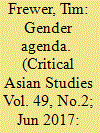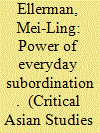|
|
|
Sort Order |
|
|
|
Items / Page
|
|
|
|
|
|
|
| Srl | Item |
| 1 |
ID:
152199


|
|
|
|
|
| Summary/Abstract |
This paper examines the material dimensions of ethnic identity claims by Japanese-Filipino children in the Philippines and non-governmental organizations (NGOs) advocating on their behalf. Most Japanese-Filipino clients of NGOs in the Philippines were raised by their Filipino families with little knowledge of their Japanese fathers and little or no lived experience of Japan. Although these children and young adults are often called “multi-cultural” by NGO workers, they frequently grow up with no connection to Japan other than an awareness of their Japanese parentage and Japanese cultural products equally accessible to most Filipinos. I argue that filiation can be leveraged to gain access to resources not only through the legal implications that are provided by biological relationships, but also through symbolically salient claims for belonging to a nation or people by virtue of descent. This consanguineal capital should primarily be understood in politically symbolic terms, mobilized in processes of claims-making and based on notions of “blood” and belonging and their frequent conflation with ethnicity.
|
|
|
|
|
|
|
|
|
|
|
|
|
|
|
|
| 2 |
ID:
152200


|
|
|
|
|
| Summary/Abstract |
Cross-border marriages between Chinese and Japanese over the past twenty years have expanded in scale and taken on new forms. The special case of Japan lies in the implication of local authorities in the promotion of these marriages, locating the matrimonial migratory route at the crossroads of familial migration and work migration from the point of view of both the migrants themselves and the host communities. Marriage migrants in Japan are one of the variations of the transfer of a feminine workforce to ensure reproductive work. While migratory policies in Japan have generally appealed to side doors for unqualified immigration, local authorities have helped create extra side doors via marriage to provide support in the context of the restructuring of reproductive work. Migrant wives also represent a potential salaried foreign workforce especially in peripheral zones which have difficulty attracting migrants. An analysis of the participation of these migrants in both reproductive and productive work (remunerated or not) enables us to better understand the contemporary debate that feminized migratory routes tend to reinforce patriarchal norms.
|
|
|
|
|
|
|
|
|
|
|
|
|
|
|
|
| 3 |
ID:
152197


|
|
|
|
|
| Summary/Abstract |
Cambodia’s mountainous northeastern province of Ratanakiri, which only twenty years ago was home to mainly indigenous minority groups largely focused on subsistence production, has undergone rapid ecological, social, and economic transformation. Deforestation and land alienation in the context of large-scale plantation agriculture, land speculation, and smallholder cash cropping have led to concerns that indigenous communities are being alienated from their land and not benefitting from economic changes. This has resulted in a significant number of NGO and government programs that attempt to protect and “empower” indigenous people, particularly women. This article examines a one-year research project which explored the relationship between indigenous women and land change in two indigenous villages. It discusses how indigenous women as well as Khmer and landless Cham immigrants have dealt with the commoditization of land and labor. It focuses on the differentiated way capitalist relations have pushed men, women, landless laborers, and increasingly wealthy landowners on increasingly divergent life trajectories. Compelled by donors to focus on gender and indigenous women as an object of governance, the NGO that directed this project struggled to keep up with the realities of capitalist relations on the ground.
|
|
|
|
|
|
|
|
|
|
|
|
|
|
|
|
| 4 |
ID:
152196


|
|
|
|
|
| Summary/Abstract |
In this essay we propose an alternative approach to assessing the state of democracy in Indonesia. We focus not on institutional indicators (as is usually the case) but on manifestations of political discourses in the public sphere. In applying post-Marxist political theory through the work of Slavoj Žižek and Chantal Mouffe, we argue that democracy’s main defining feature is that it allows antagonistic discourses about alternative policies to coexist, yet still manages to coalesce around a minimal consensus on how these discursive conflicts are to be dealt with in a fair way. Applying this approach to democracy analysis to Indonesia, we suggest that the major obstacles to democratic practice do not emerge from institutional problems, but from an overbearing political discourse that imposes broad consensus and harmony on most political issues. Political discourse in Indonesia is generally structured around “Islam” and “the people.” These themes provide a basis for a political consensus that conceals economic and social contradictions and reveals considerable depoliticization in Indonesian democratic practice.
|
|
|
|
|
|
|
|
|
|
|
|
|
|
|
|
| 5 |
ID:
152198


|
|
|
|
|
| Summary/Abstract |
This paper examines how Chinese female migrant domestic workers are influenced by different forms of subordination; how norms, practices, and power relations enable and legitimize their subordination; and the ways in which subordination elicits compliance while silencing and disempowering the workers. I advance a new perspective on subordination, linking forms of subordination with forms of consciousness. Consciousness of one’s treatment and how one is changed by it informs the decision of whether to remain silent. Compliance, silencing, and disempowerment are facilitated by recognizable and subtle forms of subordination that can directly control individuals’ actions, shift their perspectives, and cause them to act against their own interests. When workers are not conscious of the insidious impact of subtle subordination upon their attitudes, perspectives, and behavior, they are far less likely to resist.
|
|
|
|
|
|
|
|
|
|
|
|
|
|
|
|
| 6 |
ID:
152201


|
|
|
|
|
| Summary/Abstract |
In September 2015, some 5000 women workers of the Kannan Devan Hills Plantation, a large tea estate in Munnar in Kerala, launched a spontaneous agitation demanding increased wages and bonuses. They staged a massive sit-in in Munnar town, bringing operations on the tea-estate to a halt. What was unique about this strike, which garnered considerable domestic media attention, was its non-violent nature and distancing from party-affiliated tea-plantation unions. In this paper, we use interview transcripts from a community radio program to analyze whether this strike can be seen as a precursor for a “new unionism” of the great mass of contractual, informal workers in India. We do so within the broader question of whether class identity is still relevant for informal labor in the global south. We conclude that a successful working class movement can only emerge when workers understand their roles in the long and convoluted chain of profits and are able to universalize their situations through concrete political action.
|
|
|
|
|
|
|
|
|
|
|
|
|
|
|
|
|
|
|
|
|